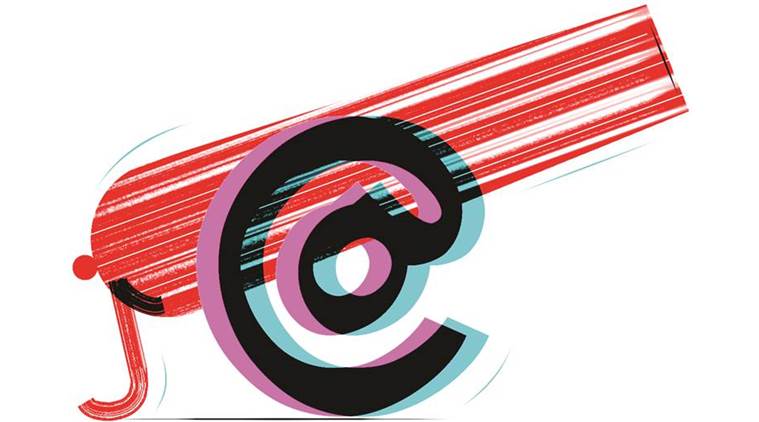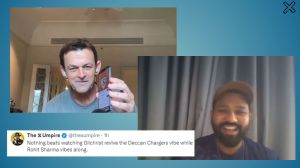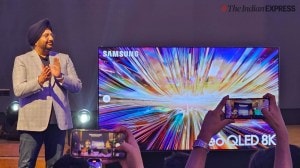- India
- International
New American consensus appears to be in sync with India’s turn towards decoupling from China
Although total digital decoupling between US and China might take a long time, if it happens at all, new rules are emerging to define terms of engagement
 Like Delhi, Washington too is citing national security concerns about the widespread use of Chinese apps. (Illustration: C R Sasikumar)
Like Delhi, Washington too is citing national security concerns about the widespread use of Chinese apps. (Illustration: C R Sasikumar)
India’s ban on the hugely popular TikTok and other Chinese apps, as part of its retaliation against China’s aggression in Eastern Ladakh, has acquired a wider dimension that few could have anticipated. TikTok is now at the centre of a rapidly expanding digital war between the United States and China.
Since Delhi’s announcement banning TikTok and other Chinese apps in June, there has been talk of similar actions by Washington. US President Donald Trump is doing one better than the NDA government. Like Delhi, Washington too is citing national security concerns about the widespread use of Chinese apps.
Rather than simply ban TikTok, Washington is “persuading” ByteDance, the Chinese internet company that owns TikTok, to hand over its business to the US technology giant, Microsoft. Trump’s threat over the weekend that he might soon ban TikTok set in motion frenzied negotiations between ByteDance and Microsoft.
Trump does not just want an American takeover of TikTok, but the best possible terms for the United States. The US president appears to have intervened in the negotiations by chatting over the phone with Microsoft’s CEO, Satya Nadella. In a statement issued after the talks, Microsoft said, it is ready to oblige the President and is “committed to acquiring TikTok subject to a complete security review and providing proper economic benefits to the United States”.
READ | Microsoft confirms plans to buy US arm of TikTok after talks with Trump

Microsoft said the negotiations with ByteDance involve more than TikTok’s operations in the US. Microsoft wants to take over the TikTok market in Canada, Australia and New Zealand. Microsoft is also promising that the deal will meet all the administration’s national security concerns.
Trump’s American critics insinuate that the president has a personal beef with TikTok that was reportedly used to inflate the confirmations to attend his election rally in Tulsa, Arizona a few weeks ago. The empty stands in Tulsa were seen as a big setback for Trump’s campaign.
Let’s assume for a moment an embarrassed Trump is getting even with a Chinese app. That does not, however, in any way reduced the political salience of the US president’s strike against TikTok. Nor does it mask Microsoft’s commercial interest in acquiring an app that could help overcome the tech giant’s glaring absence in the social media space and win a large and youthful demographic.
While much of the US media was highlighting Trump’s personal peeve, China’s Global Times had a very different point. In an editorial on Sunday, the paper called the US decision “a barbaric act of a rogue government” and denounced it as “the hunting and looting of TikTok by the US government in conjunction with US high-tech companies”.
Until recently, the mainstream commentary in the US media had poured cold water on Trump’s digital war with China as self-defeating. But the Administration officials believe the tide might be turning in America’s favour in the new digital confrontation.
Explained: What’s going on with TikTok? Here’s what we know
They point to Washington’s successful campaign against Chinese telecom companies Huawei and ZTE in recent months. Although the US did not have a candidate of its own in the race for the rollout of fifth-generation wireless technology, the Trump Administration went out of the way to persuade its allies to abandon Huawei.
Trump now seems to have embarked on a more consequential mission at home to redefine ties between US and Chinese technology companies that flourished in recent years. On Sunday, Secretary of State Mike Pompeo indicated that the takeover of TikTok is just the first step. The administration is expected to follow through with additional steps against Chinese apps in the days ahead.
Until now, Beijing was supremely confident in its assessment that it could exclude the US apps like Facebook, Gmail and Twitter from its market, but yet continue to exploit the US market for the advance of its digital entities. The reluctance to abandon the Chinese market meant the US companies were happy to swallow the humiliations that Beijing heaped upon them.
In a hard-hitting speech last month, the US Attorney General William Barr reminded Apple, Google, Microsoft and Disney not to forget their American identity and their obligations under US law.
Barr told the US corporate bosses they “might not see themselves as lobbyists” for China. But he reminded them of the dangers of being used by Beijing and that their efforts on behalf of China could invoke the provisions of the Foreign Agents Registration Act. The FARA does not prohibit lobbying but demands that lobbyists register themselves with the US government. Lobbying without registration, however, would bring many penalties.
READ | Chingari Co-founder on gaining from Atmanirbhar Bharat and not letting videos go viral immediately
Barr also told the US tech and entertainment companies that they “may view themselves as global citizens, rather than American institutions”. “But they should remember that what allowed them to succeed in the first place was the American enterprise system, the rule of law, and the security afforded by America’s economic, technological and military strength”.
Might this offensive against the extended nexus between the US companies and China come to an end if Joe Biden wins the presidency in November? US tech companies and Hollywood are certainly among big supporters of the Democratic Party. But they might have to come to terms with the shifting political terrain in Washington.
The “deep state” in Washington appears to have made up its mind on the urgency of coping with the Chinese digital threats. The attitudes across the political spectrum towards China are also hardening. Although Trump is trailing in the polls, he can take many policy actions against China until his term comes to an end next January. A complete reversal of the current actions against Chinese companies might not be easy for the next President.
Although total digital decoupling between the US and China might take a long time, if it happens at all, new rules are now emerging to define the terms of engagement.
Equally significant is the return of bipartisan US political support for “industrial policy” or conscious government effort to lead the nation’s technological and economic evolution. During the last four decades any mention of “industrial policy” was taboo in Washington’s policy community.
READ | TikTok banned in India: Indian alternatives of TikTok you can try
Last week, Trump dramatically boosted the stock prices of Kodak — the once-famous US company that went broke by continuing to make cameras in the age of smartphones. The Trump Administration, using the Defence Production Act, has lent $765 million to Kodak to start producing generic drugs and pharmaceutical ingredients. The Defence Production Act dates back to the 1950s, when the US was mobilising for the Korean War. Biden’s campaign too has embraced industrial policy as a means to cope with external and internal economic challenges to the US.
Many in Washington are now convinced that it was a terrible mistake for the US to have believed that global trade and technology flows after the Cold War were geopolitically neutral. The new American consensus appears to be in sync with India’s own recent turn towards decoupling from China and the plan to rearrange its digital engagement with the world within a framework of trusted political partnerships.
This article first appeared in the print edition on August 4, 2020 under the title ‘India and geopolitics of TikTok’. The writer is director, Institute of South Asian Studies, National University of Singapore and contributor on international affairs for The Indian Express
40 Years Ago
EXPRESS OPINION
More Explained
Apr 18: Latest News
- 01
- 02
- 03
- 04
- 05









































